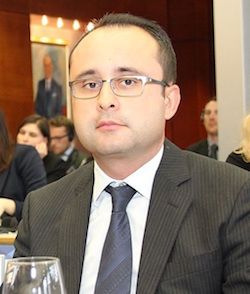European Advocates Call for Greater Real World Evidence Collaboration in MS
Medical research has much to learn from patient encounter data.

Most of the new research data about multiple sclerosis comes from clinical trials, but advocacy groups in Europe say governments are missing out on insights from another key trove of information -- the real-world data generated in doctor’s offices and pharmacies every day.
The pooling of so-called “Real World Evidence” was the topic of a conference convened in Brussels last week by the European Multiple Sclerosis Platform, a Belgium-based advocacy group. The event was meant to promote the idea of a European Network of MS patient data registries. Officials believe pooling multinational data would not only aid MS researchers, but also improve the equity of healthcare from country to country.
“We need better data for better patient-related health outcomes”, said Cristian Busoi (photo), a European Parliament member from Romania, who helped lead the conference.
Real World Evidence (RWE) is defined as disease-specific patient data collected at the point of care, or from prescription databases, pharmacovigilance, or even via social media. Such data is already compiled at a national level in some countries. However, Busoi said RWE isn’t being exploited as much as it could be.
“As an example: RWE can give an indication on whether work-focused MS therapies are cost-effective and ultimately bring a societal contribution,” he said.
Cost-effectiveness is a major part of the issue. Advocates believe RWE could help drive down the cost of MS treatments by helping payers zero in on the treatments that have the best long-term outcomes and presumably encourage use of those therapies over other, less cost-effective measures. They also point out that this data is much less expensive to obtain than clinical trial data.
Yet, while many countries collect data on patients with MS and other conditions, the patient populations in individual countries often aren’t large enough to provide meaningful data. That’s why Busoi and others say it’s critically important for countries to collaborate.
Real World Evidence has become a topic of conversation in the United States, as well. The 21st Century Cures Act, which was signed into law by President Barack Obama in December, called for the Food and Drug Administration to develop a framework and guidance to utilize RWE. However, just before the act became law, 15 FDA officials published a letter in the New England Journal of Medicine urging caution when it comes to RWE. They warned that “the confluence of large data sets of uncertain quality and provenance, the facile analytic tools that can be used by non-experts, and a shortage of researchers with adequate methodologic savvy” could lead to unreliable study results.
Christoph Thalheim, director of external affairs for the European Multiple Sclerosis Platform, said the solution to such concerns is government support.
“Commonly agreed ‘minimum data sets’ can be applied as standard for all MS registries as part of a European Network of national MS registries,” he said. “But for this to happen we need political will and a reasonable level of funding via public/private partnerships.”
Thalheim said an existing network of 13 countries pooling MS data has proven valuable. He hopes to expand the program.
The themes of last week’s RWE discussion echo an article published last May in BMC Medicine, which argued that such data could be particularly helpful when tracking longitudinal results of certain treatments and therapies.
“By collecting information on additional outcome measures, such as MRI and cognition, their importance in guiding treatment could be examined,” wrote corresponding author Tjalf Ziemssen, MD, of the University Clinic of Carl-Gustav Carus, in Dresden, Germany. “By continually expanding the data pool through collaborations, the validity and utility of RWE to physicians and regulatory bodies will be improved, fostering greater and better physician/patient engagement.”
Busoi's comments are in a press release.
Related Coverage:
$2.5 Billion Deal for Multiple Sclerosis Drug
New Study Adds to Case for Stem-Cell Transplants as MS Therapy
For Proper Diagnosis and Treatment of MS, Time is of the Essence